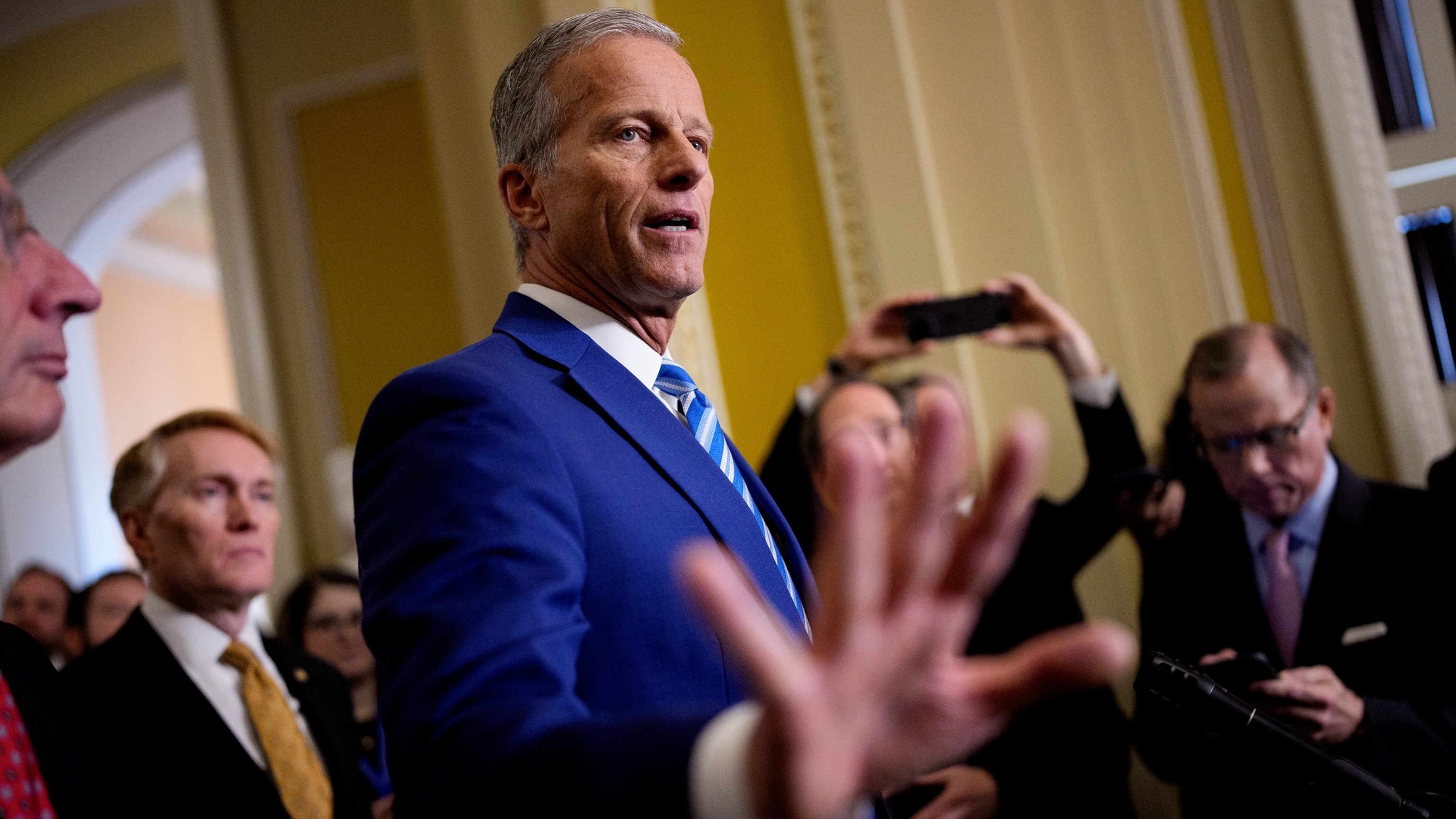
As the federal government shutdown drags into its fourth week, new revelations about widespread misuse of taxpayer-funded food assistance programs have ignited outrage across the country.
At the center of the firestorm is the Supplemental Nutrition Assistance Program (SNAP) — better known as food stamps — which millions of low-income Americans rely on to feed their families.
But now, as Congress remains deadlocked, millions of lawful citizens could lose benefits by November 1, while reports indicate that billions of dollars have already been siphoned away to non-citizens through loopholes and lax enforcement.
According to a recent analysis by the Economic Policy Innovation Center (EPIC), nearly 1.8 million non-citizens received SNAP benefits in fiscal year 2023, costing American taxpayers roughly $5.7 billion.
Those figures represent a sharp rise from previous years, aligning with the unprecedented surge of migrants entering the country under the Biden-Harris administration.
Despite federal law clearly prohibiting undocumented immigrants from accessing SNAP, the program’s rapid expansion and lack of oversight have created a perfect storm for abuse — one that critics say was both predictable and preventable.
Under the 1996 welfare reform act signed by President Bill Clinton, undocumented immigrants were explicitly barred from participating in federal assistance programs, including SNAP.
The law was clear: only U.S. citizens and certain categories of lawful permanent residents were eligible. Yet as the border crisis has exploded and “mixed-status” households have grown — those with both legal and illegal residents — SNAP administrators have struggled to verify eligibility. The result: billions flowing into the hands of people who were never meant to receive a dime.

“SNAP is not and has never been available to undocumented non-citizens,” the USDA reiterated in a 2023 statement. But recent audits and internal data tell a different story.
Enforcement failures, coupled with administrative confusion, have allowed illegal immigrants and their dependents to draw from a program meant for struggling American families.
In fiscal year 2022 alone, USDA data revealed that 1.5 million non-citizens received $4.2 billion in benefits — a number that has since ballooned by more than a billion dollars.
Matthew Dickerson, Director of Budget Policy at EPIC, said the findings are an indictment of Washington’s misplaced priorities. “I think many Americans are shocked to learn that the federal government is spending so much of their hard-earned tax dollars on welfare for non-citizens,” Dickerson said.
“At a time when inflation has squeezed family budgets, it’s unconscionable that federal aid is being diverted to people who aren’t even supposed to be in the country.”
The issue has taken on new urgency as the shutdown stalemate threatens to halt SNAP payments altogether. Without a funding agreement, the USDA estimates that benefits for over 42 million recipients will be frozen starting November 1 — a scenario that would leave countless families unable to afford food.
But the revelation that billions have already been funneled to ineligible recipients has intensified public anger, particularly among those who view the program as emblematic of the government’s dysfunction.
For many Americans, the situation feels like a betrayal. In states from Texas to Ohio, local grocers and community workers report increasing anxiety among families who depend on SNAP to make ends meet.

“I’ve got single mothers asking if their EBT cards will stop working next week,” said one food pantry volunteer in Pennsylvania. “Meanwhile, the government is wasting money on people who aren’t even citizens. It’s insane.”
The controversy also has a dangerous edge. As online chatter about a potential benefits freeze grows, law enforcement agencies have begun monitoring social media platforms for threats of looting or organized theft.
Some self-identified SNAP recipients have openly posted that they will “take what they need” if benefits stop. In major cities already struggling with crime waves, the possibility of widespread unrest is a growing concern.
Republicans have seized on the issue, framing it as both a moral and fiscal crisis. “The Democrats have turned compassion into corruption,” said Rep. Steve Scalise (R-LA).
“They’re stealing from working families to fund a broken welfare system that now rewards illegal immigration. That’s not policy — that’s madness.” Senate Majority Leader John Thune echoed the sentiment on the chamber floor, arguing that “every dollar wasted on illegal benefits is a dollar taken away from a hungry American child.”
Meanwhile, Democrats have tried to downplay the reports, insisting that most SNAP spending still goes to eligible citizens and legal residents. However, internal data from the Congressional Budget Office (CBO) projects that SNAP expenditures will increase by $15 billion over the next decade, much of it tied to the costs associated with non-citizens and their U.S.-born children.
Critics warn that this projection represents a structural crisis — one that could cripple the integrity of the welfare system.
The political optics are devastating. As millions of citizens brace for a potential benefit cutoff, the image of illegal immigrants collecting taxpayer-funded food aid is fueling outrage far beyond conservative circles.

Independent voters, particularly in working-class communities hit hardest by inflation, view the issue as proof that Washington’s priorities are upside down.
“I work full-time, pay my taxes, and still can’t afford groceries,” said a construction worker in Ohio. “But people who broke the law to get here are getting government handouts. It’s beyond unfair.”
The administration’s defenders argue that the problem lies in outdated systems, not policy intent. “This isn’t about ideology — it’s about bureaucracy,” said one Democratic aide.
“Eligibility systems are complicated, states interpret them differently, and verification is difficult in households where some members are citizens and others aren’t. That’s what causes the overlap.”
But to many voters, such explanations ring hollow. The perception that the government can’t control its own welfare programs only reinforces broader concerns about border security, fiscal responsibility, and fairness.
At the same time, the looming SNAP shutdown is exposing another uncomfortable truth: the program is more fragile than most Americans realize. Created as part of the 1964 Food Stamp Act, SNAP was designed as a “last-resort safety net” to prevent hunger during times of economic hardship.
Today, it serves more than one in eight Americans, distributing nearly $120 billion annually. But with enrollment swelling and oversight weakening, even minor disruptions can trigger cascading effects. If the shutdown extends past next week, families could begin rationing food — or worse, going without entirely.
Economists warn that a lapse in SNAP benefits would ripple across the entire economy. “Every dollar spent on SNAP generates roughly $1.50 in economic activity,” said a policy analyst at the Manhattan Policy Institute.

“Cutting those benefits abruptly could depress local economies, particularly in rural areas and low-income urban neighborhoods.” But for Republicans, the focus remains on accountability. They argue that without addressing the misuse of funds, any extension of SNAP funding simply perpetuates the problem.
Grassroots organizations and watchdog groups are now demanding an immediate audit of SNAP distribution to identify and recover funds illegally accessed by non-citizens.
The Federation for American Immigration Reform (FAIR) has called for Congress to reinstate stronger verification measures and criminal penalties for fraud.
“There is no moral justification for diverting welfare from citizens to illegal immigrants,” a FAIR spokesperson said. “Every penny that goes to someone who broke our laws to get here is a slap in the face to the Americans who follow them.”
For the Biden administration, the timing could not be worse. With the shutdown already eroding public confidence, the revelation of billions misdirected to illegal immigrants has turned a budget crisis into a political disaster.
Polling shows voter trust in government spending and social programs plummeting, particularly among independents and lower-income Americans — the very groups Democrats have long relied on.
The debate is also rekindling deeper questions about the sustainability of the welfare state itself. Can a system designed for 20th-century America survive the pressures of 21st-century migration, inflation, and bureaucracy?
Critics say no — not without serious reform. They point to the current crisis as proof that the government has lost control of its most basic functions: protecting borders, safeguarding taxpayer money, and ensuring that social safety nets serve those they were meant to help.

As the shutdown drags on, the clock is ticking. The USDA has already begun warning states to prepare for service interruptions. Unless Congress acts, millions of Americans could wake up on November 1 to find their EBT cards empty — even as billions continue to flow to households that never should have been eligible in the first place.
The symbolism is inescapable: a government too divided to protect its own citizens, yet too reckless to stop subsidizing those who entered illegally.
For struggling families, that’s not just a policy failure — it’s a moral one. “You tell people to follow the law, to work hard, to play by the rules,” said one SNAP recipient in Michigan. “And then you watch the government reward the people who didn’t. That’s when you start to lose faith.”
Whether this crisis becomes a turning point or just another scandal buried by partisan politics remains to be seen. But one thing is clear: America’s safety net is unraveling, and unless leaders act decisively, the damage may soon be irreversible.



